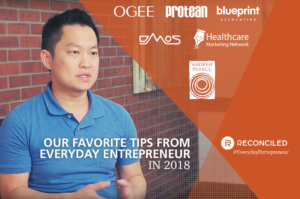We started Everyday Entrepreneur — our monthly Facebook Live video series — in 2018 to highlight the stories of entrepreneurs we saw doing the true work of starting and growing a business. They’re normal people like you and me with dreams and families and lines of credit.
All over the country, these everyday entrepreneurs work to build companies that inspire their customers, but they also work to put food on their tables, to build wealth and value for themselves and for their families.
Their faces may not grace the cover of Forbes (yet), but their stories and their insights can help all of us become better entrepreneurs.
We compiled our favorite pieces of advice from the seven interviews we did in 2018, and we hope they inspire you as much as they inspired us.
Build what your customers want
Prior to starting her current company, Carol Bush, Co-Founder of Healthcare Marketing Network , provided social media consulting to healthcare practices. When she and her co-founder were creating the sales packages for Healthcare Marketing Network, they threw in blogging services as an afterthought.
But over time, they found that their customers were really looking for the content, not the social media consulting. Through listening to what their customers wanted, Bush and her cofounder discovered their real strategy — becoming “the external content engine for a healthcare business.”
Their company is now a successful global collective of freelance writers and creatives in the healthcare niche — writers, authors, keynote speakers, podcasters — that help healthcare businesses and entrepreneurs craft compelling content.
Be on the lookout for problems, er…inspiration
When Ali Sarafzade, Founder and CEO of Protean saw his daughter learning coding through an online platform, he realized something: “she was doing all this learning outside of the four walls of the school that was relevant to her education, and her teachers didn’t know about any of it. And I thought that’s a problem ” — the three most inspiring words for any entrepreneur.
He solved that problem by starting Protean, an online proficiency-based student learning platform, to capture 360 degrees of learning in a way no other platform was doing.
Watching her child’s activities also provided inspiration for Susan Pieper, CEO, and Founder of DMOS Collective , a tool company that designs specialized adventure shovels. Based in Wyoming, she watched her son and his friends compete in snowboarding and saw how much they would benefit from shovels that could help them build the “kickers” they would use to performer bigger and more exciting tricks.
With that inspiration, she began working on the first prototype for DMOS Collective.
Test the waters before jumping in with a co-founder
Carol Bush (Healthcare Marketing Network) and her co-founder Janet Kennedy met on Twitter and quickly saw the possibilities for combining their two separate entities into one focused business.
But before they signed on that official dotted line, they did a few trial runs — ran several webinars together and built some content projects — to see whether they were compatible business partners. They were also very transparent about finances and about their personal and professional plans.
They still are. “There’s lots of partnership and collaboration. Every financial decision we make, we make together,” says Bush. “I’m almost closer to Janet than I am to my husband.”
Anticipate future needs before you actually need them
Abbott Stark, Co-founder, and CMO of Ogee , a luxury organic skincare line, won a local entrepreneurial pitch competition. When the prize package included bookkeeping services (from Reconciled), the company went ahead and signed on even though their bookkeeping needs weren’t very intense at the time.
“Thank goodness we established that when we did,” says Stark. “We launched later that year, and our sales just took off. Having the bookkeeping has just been beyond – it’s so much more than bookkeeping for us. You’ve really been a financial advisor on so many of our financial issues.”
Be honest with family members (and yourself) about your goals
If you have a spouse and/or children, your path to entrepreneurship will impact them. Byron Batres, Founder and CEO of EZ-Probate , an online probate support company, emphasized how important it was to talk honestly with his wife about his plans for the business.
“There’s an emotional component to doing what we do, and there’s a financial component,” says Batres. “I think people minimize the emotional component. You really need to take an honest assessment of where you are both emotionally and financially because it’s stressful… It has an impact on the family. I don’t ever not think about it. There are times where my kids are in front of me, and they have to poke me because I’m somewhere else.”
Family members will be more supportive, says Batres, if “you have a good conversation about what your goals are and what it might take to get this…because it’s not coming from left field and they have more knowledge about it. Obviously, you have to have a good idea of what resources it’s going to take financially and where are they going to come from.”
Share about what you’re doing as often as possible
Abbott Stark (Ogee) emphasized not just the importance of pitching (“everyone and often”) but also the technology that allows us to do it with ease. “I want to bring out my iPhone. Look at these huge screens,” he says.
”We have these very powerful computers in our pockets now. You can just show everybody right on the spot now — flip through a PowerPoint pdf on your phone. Keeping the communication open and out there about the brand was really how we got it off the ground.”
Recognize what a startup job has to offer
Hiring people for a position with a startup can be difficult, especially in the beginning when the compensation package is a little on the low side. Andrew Pearce, Founder of Andrew Pearce Bowls , focused on communicating his vision for the company’s future and on providing those things that only a startup can.
“You have to remember,” he says, “there’s a lot of different types of people out there. Some people like working for a big company. There are other people where that’s the last thing in the world that they want. They like the idea of working in a small woodworking shop with a couple of other people. It took a while for me to understand what type of person likes working for an entrepreneur and likes being in a small, individualized team.
For example, every Thursday for the last couple of years I cook lunch for the whole company, and we all get together and have fun like that. There’s not a lot of big businesses that are going to do that for a team. So, there are things that we can do those other people can’t do. There’s a lifestyle that we can provide. We try to attract people that are into the types of things that we’re into.”
Leverage your past experience
Not everyone talked about it directly, but each of our entrepreneur guests also leveraged their past experience to build the companies they run today. Abbott Stark spent over a decade in the skincare industry before starting Ogee. Byron Batres worked as a certified financial planner, frequently helping clients with probate issues, before starting EZ-Probate. Andrew Pearce worked in his father’s artisan glassware business before starting his own artisan craft business.
Susan Pieper used decades of experience in the startup world to launch her own venture. Carol Bush turned her solo social media consulting business into a global network of healthcare writers and content creators.
Don’t go it alone
The single most frequent piece of advice our guests shared was to seek out and accept help.
Susan Pieper (DMOS Collective) recommends that every entrepreneur works with a performance coach. Of her own coach, Pieper says, “It’s all about me playing the game of being the best CEO I can possibly be, and he holds me to task on that. I think keeping someone like that in your corner is critical — who is safe but with whom you can really lay it all on the line.
How does she choose a coach? “For me, a coach has to have been in my shoes. It’s not someone who’s been on the sidelines who has studied it. It’s the player-coach model.”
Andrew Pearce (Andrew Pearce Bowls) is a third-generation craftsman, but that didn’t mean he knew everything about working as an artisan entrepreneur. After starting his own company, he was “very quickly humbled into saying can I please have some help… Asking for help is one of the biggest lessons from entrepreneurship for me,” says Pearce. “It might be advice, it might be finishing a product. It doesn’t matter what it is. It’s just that willingness to say I need some help. The high failure rate is because a lot of people don’t know how to ask for help or they’re too proud to ask for help.”
Sean Duffy, Co-Founder of Blueprint Accounting , a semifinalist for Canada’s Intuit Firm of the Future, echos both Pearce and Pieper. “I reach out a lot to industry peers, and we’ve brought on a business coach for our business,” he says. “I think it’s important to bounce those ideas around and see that there’s another world. Sometimes you get stuck in your own thoughts. Don’t be afraid to reach out to other entrepreneurs.”
We’ve been so inspired by these entrepreneurs’ stories. What would you tell someone just starting out as an entrepreneur? What have you learned along your journey?
The post Our Favorite Tips from Everyday Entrepreneur 2018 appeared first on Reconciled.
Recent Posts







